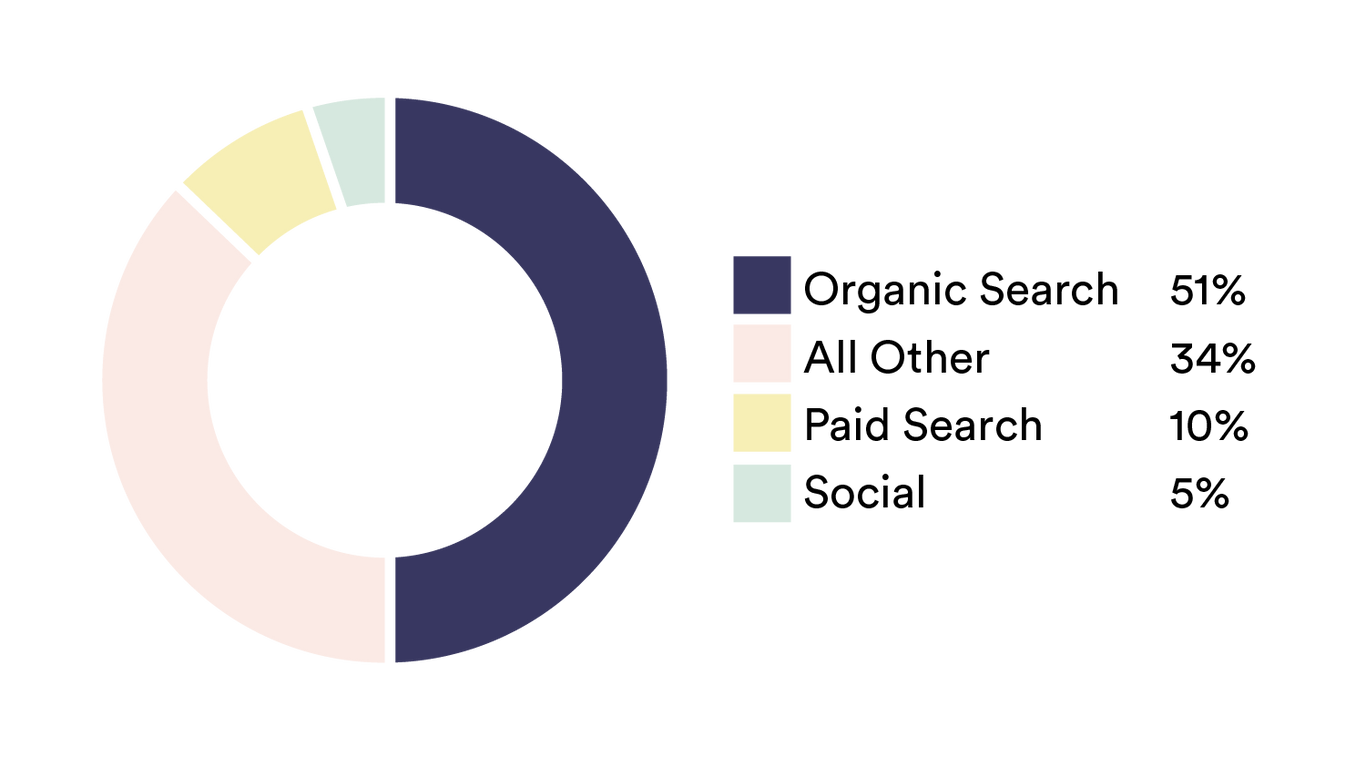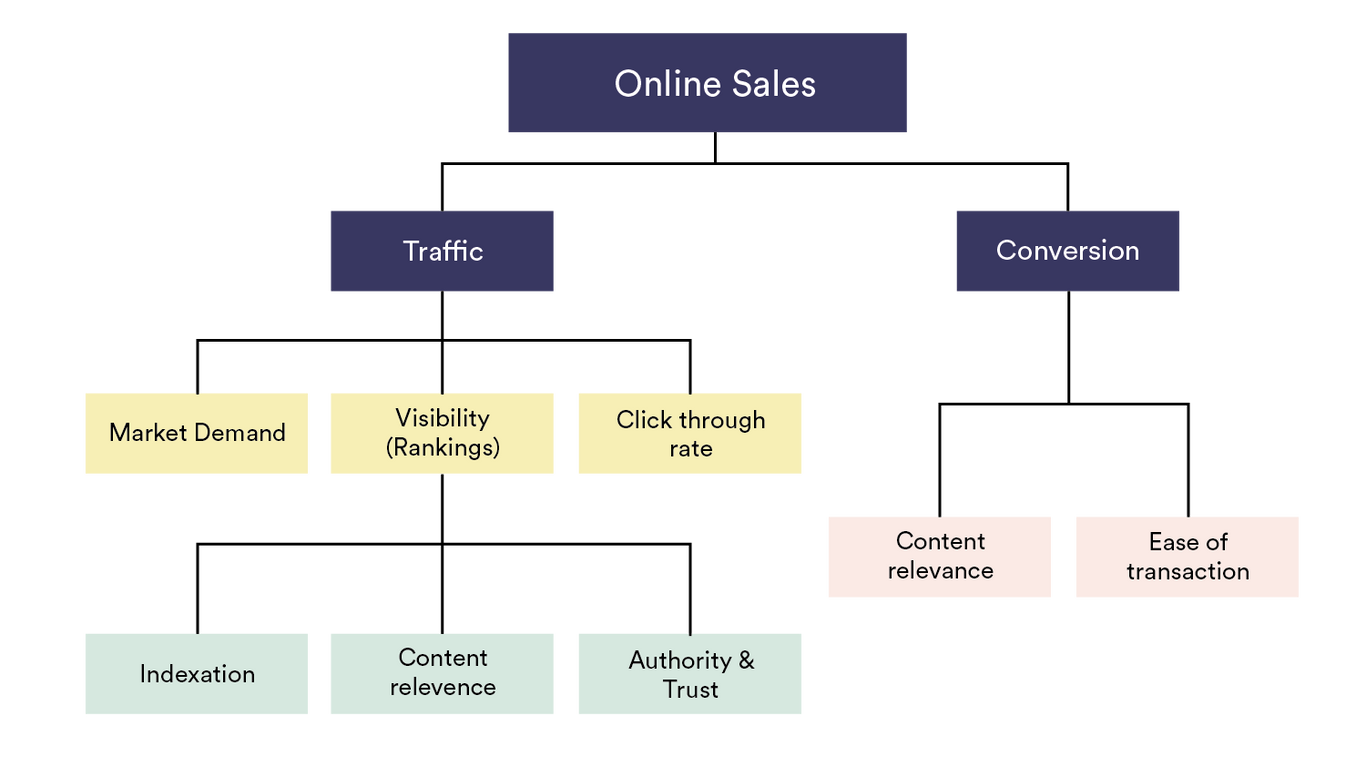SEO and Paid Media
Why SEO drives online sales
09/30/19
So, you want to increase your online sales? Why wouldn’t you? Global digital commerce sales are projected to hit $6 trillion USD by 2022, according to Forbes magazine.
And this isn't just related to B2C. Ecommerce sales on websites, login-portals and marketplaces grew past $1 trillion USD for the first time in 2018. Whether you’re in B2C or B2B, online sales should be high on your priority list.
How do I increase online sales?
Let’s take a look at what drives online sales. If we exclude the strength of your individual brand and just look at your site, there are two key factors that are the main drivers behind your online sales.
Traffic & conversion rate
Traffic is the amount of users who visit your site. This sets the bar for how much you can actually sell online; if you were a store manager you wouldn't be able to sell to people who didn’t enter your store, right? Same thing.
Your conversion rate is the percentage of users who visit your website that complete a transaction (a conversion) out of the total number of visitors. Having a high conversion rate usually means people want what you're offering, and they're able to get it easily. Together, these measurements represent the total number of potential customers visiting your site, and how effectively you’re converting them into real customers. But how do you boost your website traffic, and your conversion rate? Let’s look at the major drivers for these two key metrics.
Conversion rates
We’ll begin by quickly covering off conversion rates. There are two key things that will influence your conversion rate from an SEO/ digital perspective:
- Content relevance
- Ease of transaction
Content relevance
How well does your content (blog posts, infographics, whitepapers and offers etc.) match market demand? And is it meeting the expectations of your potential customers? Too often I see websites working from the inside out rather than starting from the outside – the customer’s perspective - and working back from there. There is, of course, the volume of content as well. Consumers today do more research and engage with more content than ever before to support their purchase decisions:
- 70-90% of the buyer's journey is complete prior to engaging a vendor (Forrester)
- Consumers engage with 11.4 pieces of content prior to making a purchase (Forrester)
- Consumers are 5x more dependent on content than they were 5 years ago (Nielsen)
Ease of transaction
Any friction your users experience during a transaction could be detrimental to your conversion rate. Creating a smooth customer journey, using a safe and easy payment method, and doing some simple A/B testing on key pages are all examples of things you can do to make the transaction process easier. This may require some investment, but it can have a big impact on your online sales.
Traffic
Traffic can come from many channels, but since this blog post is about driving online sales with SEO, we’re going to focus on the main source of all online traffic: organic search. Organic search accounts for 51% of all traffic in the Nordics, and 75% of smartphone users turn to search first to address their immediate needs.

So what drives traffic from organic search?
There are three main factors:
- Market demand - The number of potential clients interested in your area
- Click through rate (CTR) - The ratio of users who click on your page compared to the market demand
- Visibility (ranking) - Your position on Google
Market demand
Listening to your customers’ needs and responding to them will affect your traffic, and the bigger the demand the bigger the traffic potential. Any SEO expert will tell you: Google search data is the richest source of information on how your audience thinks and acts. With Google search data we can measure and compare products or services your customers are craving, and find out what questions they need answers to. We are literally capable of comparing the demand for apples and oranges, or apples and apples for that matter.
Click through rate
So, what determines your CTR from Google search results? There are plenty of nitty gritty answers to this question, but the main factor influencing your CTR is your ranking in Google’s search results. Ranking first is naturally going to generate a better CTR than ranking fifth. The standing joke within SEO is: “where is the best place to hide a body?” “Page two on Google, no one looks there.” So, how do we affect our ranking?
Visibility (ranking)
Now we’re getting down to actual Search Engine Optimization - SEO. Your SEO strategy will determine the rank of your site, and it can get pretty complicated, particularly with larger websites. To affect a website’s ranking - large or small – we need to consider the algorithm behind the search engine. The three main focal points for Google’s algorithm are:
Indexation - Is your content in Google’s Index, i.e. their database? Otherwise it’s hard for Google to see and understand your content.
Topical Relevance - Is your content relevant to users?
Authority & Trust - Are you a strong, trustworthy source?
There are many factors that come into this. For example, your site’s indexation would be jeopardized if a developer were to accidentally remove it from Google’s site index; this happens more often than you’d think!
Summary
SEO is a massive contributor to generating online sales. Walking quickly backwards through our logic; SEO drives rankings and visibility in search engines, like Google, and subsequently drives traffic to your site, which is the main source of your online sales.

I hope I made this easy to understand, but in practice it’s hard to accomplish. The truth is, even with the help of experts, success will not come overnight. But in the words of a great business pioneer:
If you really look closely, most overnight successes took a long time. - Steve Jobs
If you’d like to discuss this topic further or learn how we can help you get to grips with online sales or other tricky SEO-related or marketing topics, why not contact us?



